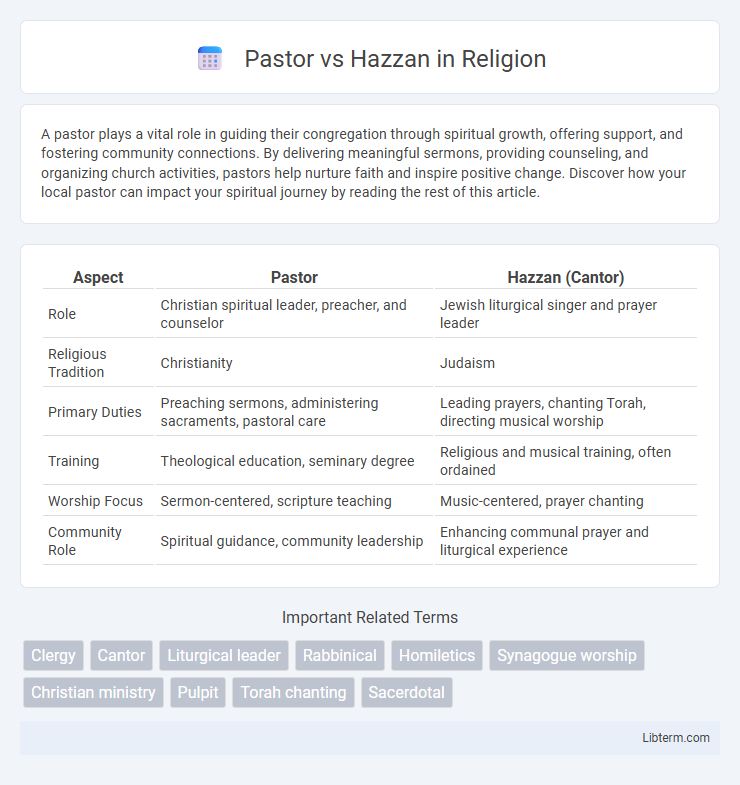A pastor plays a vital role in guiding their congregation through spiritual growth, offering support, and fostering community connections. By delivering meaningful sermons, providing counseling, and organizing church activities, pastors help nurture faith and inspire positive change. Discover how your local pastor can impact your spiritual journey by reading the rest of this article.
Table of Comparison
| Aspect | Pastor | Hazzan (Cantor) |
|---|---|---|
| Role | Christian spiritual leader, preacher, and counselor | Jewish liturgical singer and prayer leader |
| Religious Tradition | Christianity | Judaism |
| Primary Duties | Preaching sermons, administering sacraments, pastoral care | Leading prayers, chanting Torah, directing musical worship |
| Training | Theological education, seminary degree | Religious and musical training, often ordained |
| Worship Focus | Sermon-centered, scripture teaching | Music-centered, prayer chanting |
| Community Role | Spiritual guidance, community leadership | Enhancing communal prayer and liturgical experience |
Introduction: Defining Pastor and Hazzan
A pastor is a Christian clergy member responsible for leading a congregation, preaching sermons, and providing spiritual guidance. A hazzan, also known as a cantor, is a Jewish liturgical musician who leads prayer services and chants traditional prayers. Both roles serve as spiritual leaders but function within distinct religious traditions and practices.
Historical Origins of Pastors and Hazzans
The historical origins of pastors trace back to early Christian communities where leaders were referred to as "pastores," meaning shepherds, symbolizing their role in guiding believers. Hazzans, or cantors, originate from ancient Jewish traditions, serving as trained musicians who lead congregational prayers and chants in synagogues. Both roles developed to fulfill spiritual leadership and worship functions within their respective religious frameworks.
Roles and Responsibilities in Worship
Pastors primarily lead Christian worship services by delivering sermons, offering spiritual guidance, and overseeing church activities, while Hazzans, or cantors, specialize in Jewish liturgical chanting, leading prayers, and ensuring proper pronunciation of Hebrew texts during synagogue services. Pastors often administer sacraments such as baptism and communion, whereas Hazzans facilitate ritual prayers and Torah readings, supporting congregational participation. Both roles emphasize spiritual leadership but differ substantially in religious traditions, liturgical functions, and modes of worship expression.
Religious Training and Qualifications
Pastors typically receive formal theological education at seminaries, including degrees in divinity or ministry, and undergo ordination within Christian denominations; their training emphasizes scripture interpretation, pastoral care, and leadership skills. Hazzans, or cantors in Jewish tradition, often attend specialized cantorial schools where they study liturgical music, Hebrew language, and Jewish law, and must be skilled in chanting prayers and leading synagogue services. Both roles require deep religious knowledge and community leadership, but pastors focus more broadly on preaching and pastoral duties while hazzans focus on musical worship and ritual proficiency.
Key Differences in Leadership Styles
Pastors typically exercise leadership through preaching, teaching, and pastoral care, emphasizing personal guidance and spiritual nurturing within Christian congregations. Hazzans (cantors) lead primarily through liturgical singing and chanting in Jewish worship, focusing on musical expertise and congregational participation in prayer services. The key difference lies in the pastor's role as a spiritual shepherd and counselor, while the hazzan serves as the musical and liturgical leader, each shaping community experience through distinct methods aligned with their religious traditions.
Musical and Liturgical Duties
Pastors primarily lead congregational worship through preaching and teaching, often incorporating hymns and contemporary worship music. Hazzans, or cantors, specialize in leading traditional Jewish liturgical chants and prayers, using melodic chanting to enhance synagogue worship. The musical duties of hazzans involve precise knowledge of nusach (Jewish prayer modes), while pastors may utilize a broader range of musical styles to support sermons and congregational participation.
Cultural Significance in Congregations
Pastors hold a central role in Christian congregations, guiding spiritual growth, leading worship, and providing pastoral care, which deeply influences church culture and community cohesion. Hazzans, or cantors, are vital in Jewish congregations, leading liturgical music and prayer, thereby preserving religious traditions and enhancing communal worship experiences. Both roles embody cultural significance by fostering a collective identity and spiritual connection within their respective faith communities.
Gender Roles and Contemporary Changes
Pastor roles have historically been male-dominated, reflecting traditional Christian leadership structures, while Hazzan (cantor) positions in Judaism were often limited to men due to religious laws. Contemporary changes show increased inclusion, with many denominations ordaining women as pastors, and some Jewish communities embracing female Hazzanim, challenging previous gender norms. These shifts highlight evolving gender roles within religious leadership, promoting gender equality and diversifying spiritual representation.
Interfaith Comparisons: Pastor and Hazzan
The roles of Pastor and Hazzan differ significantly in religious traditions, with the Pastor serving as a spiritual leader in Christian communities and the Hazzan fulfilling the role of cantor in Jewish worship. Pastors often lead sermons, provide pastoral care, and oversee church activities, while Hazzans specialize in leading liturgical prayers and musical chanting during synagogue services. Both positions require deep theological knowledge and play vital roles in fostering community worship and spiritual guidance within their respective faiths.
Conclusion: Appreciating Distinct Contributions
Pastors and hazzans each play essential roles within their religious communities, offering distinct spiritual leadership and worship guidance rooted in Christian and Jewish traditions, respectively. Recognizing their unique contributions helps foster interfaith understanding and respect for diverse expressions of faith. Appreciating these differences enriches community cohesion and spiritual growth across varied religious landscapes.
Pastor Infographic

 libterm.com
libterm.com